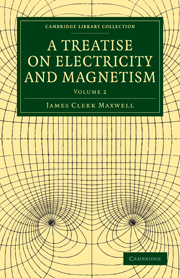Book contents
- Frontmatter
- Contents
- PART III MAGNETISM
- PART IV ELECTROMAGNETISM
- CHAPTER I ELECTROMAGNETIC FORCE
- CHAPTER II MUTUAL ACTION OF ELECTRIC CURRENTS
- CHAPTER III INDUCTION OF ELECTRIC CURRENTS
- CHAPTER IV INDUCTION OF A CURRENT ON ITSELF
- CHAPTER V GENERAL EQUATIONS OF DYNAMICS
- CHAPTER VI APPLICATION OF DYNAMICS TO ELECTROMAGNETISM
- CHAPTER VII ELECTROKINETICS
- CHAPTER VIII EXPLORATION OF THE FIELD BY MEANS OF THE SECONDARY CIRCUIT
- CHAPTER IX GENERAL EQUATIONS
- CHAPTER X DIMENSIONS OF ELECTRIC UNITS
- CHAPTER XI ENERGY AND STRESS
- CHAPTER XII CURRENT-SHEETS
- CHAPTER XIII PARALLEL CURRENTS
- CHAPTER XIV CIRCULAR CURRENTS
- CHAPTER XV ELECTROMAGNETIC INSTRUMENTS
- CHAPTER XVI ELECTROMAGNETIC OBSERVATIONS
- CHAPTER XVII ELECTRICAL MEASUREMENT OF COEFFICIENTS OF INDUCTION
- CHAPTER XVIII DETERMINATION OF RESISTANCE IN ELECTROMAGNETIC MEASURE
- CHAPTER XIX COMPARISON OF ELECTROSTATIC WITH ELECTROMAGNETIC UNITS
- CHAPTER XX ELECTROMAGNETIC THEORY OF LIGHT
- CHAPTER XXI MAGNETIC ACTION ON LIGHT
- CHAPTER XXII ELECTRIC THEORY OF MAGNETISM
- CHAPTER XXIII THEORIES OF ACTION AT A DISTANCE
- INDEX
- Plate section
CHAPTER I - ELECTROMAGNETIC FORCE
Published online by Cambridge University Press: 05 July 2011
- Frontmatter
- Contents
- PART III MAGNETISM
- PART IV ELECTROMAGNETISM
- CHAPTER I ELECTROMAGNETIC FORCE
- CHAPTER II MUTUAL ACTION OF ELECTRIC CURRENTS
- CHAPTER III INDUCTION OF ELECTRIC CURRENTS
- CHAPTER IV INDUCTION OF A CURRENT ON ITSELF
- CHAPTER V GENERAL EQUATIONS OF DYNAMICS
- CHAPTER VI APPLICATION OF DYNAMICS TO ELECTROMAGNETISM
- CHAPTER VII ELECTROKINETICS
- CHAPTER VIII EXPLORATION OF THE FIELD BY MEANS OF THE SECONDARY CIRCUIT
- CHAPTER IX GENERAL EQUATIONS
- CHAPTER X DIMENSIONS OF ELECTRIC UNITS
- CHAPTER XI ENERGY AND STRESS
- CHAPTER XII CURRENT-SHEETS
- CHAPTER XIII PARALLEL CURRENTS
- CHAPTER XIV CIRCULAR CURRENTS
- CHAPTER XV ELECTROMAGNETIC INSTRUMENTS
- CHAPTER XVI ELECTROMAGNETIC OBSERVATIONS
- CHAPTER XVII ELECTRICAL MEASUREMENT OF COEFFICIENTS OF INDUCTION
- CHAPTER XVIII DETERMINATION OF RESISTANCE IN ELECTROMAGNETIC MEASURE
- CHAPTER XIX COMPARISON OF ELECTROSTATIC WITH ELECTROMAGNETIC UNITS
- CHAPTER XX ELECTROMAGNETIC THEORY OF LIGHT
- CHAPTER XXI MAGNETIC ACTION ON LIGHT
- CHAPTER XXII ELECTRIC THEORY OF MAGNETISM
- CHAPTER XXIII THEORIES OF ACTION AT A DISTANCE
- INDEX
- Plate section
Summary
475.] It had been noticed by many different observers that in certain cases magnetism is produced or destroyed in needles by electric discharges through them or near them, and conjectures of various kinds had been made as to the relation between magnetism and electricity, but the laws of these phenomena, and the form of these relations, remained entirely unknown till Hans Christian Örsted, at a private lecture to a few advanced students at Copenhagen, observed that a wire connecting the ends of a voltaic battery affected a magnet in its vicinity. This discovery he published in a tract entitled Experimenta circa effectum Conflictûs Electrici in Acum Magneticam, dated July 21, 1820.
Experiments on the relation of the magnet to bodies charged with electricity had been tried without any result till Örsted endeavoured to ascertain the effect of a wire heated by an electric current. He discovered, however, that the current itself, and not the heat of the wire, was the cause of the action, and that the ‘electric conflict acts in a revolving manner,’ that is, that a magnet placed near a wire transmitting an electric current tends to set itself perpendicular to the wire, and with the same end always pointing forwards as the magnet is moved round the wire.
- Type
- Chapter
- Information
- A Treatise on Electricity and Magnetism , pp. 128 - 145Publisher: Cambridge University PressPrint publication year: 2010First published in: 1873

